#Lord Ryan Art
Text
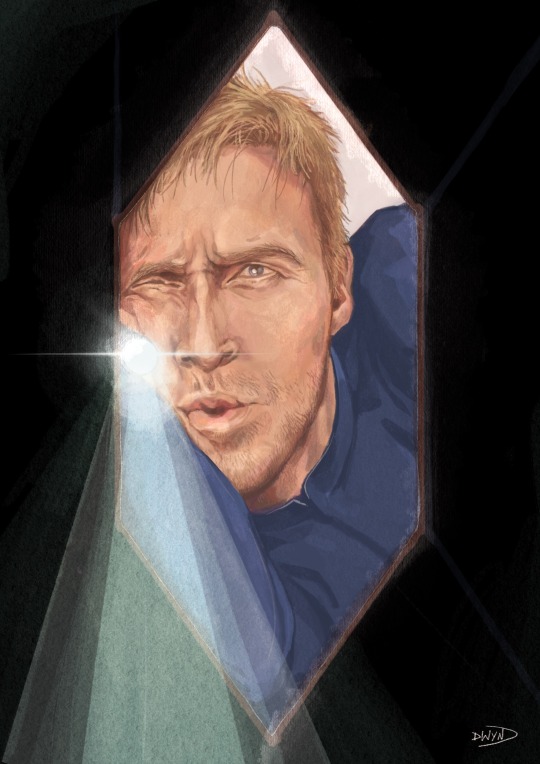
What I imagine you would’ve seen if you were standing on the other side of the hexagon wall
#pls stop holding your face against the burning surface sir#ryland grace#project Hail Mary#I loved this book so much#What a way to be introduced to the saviour of earth#I can’t wait for lord and miller’s interpretation#this man had better be an absolute car crash#project Hail Mary fanart#andy weir#phm#phm fanart#Dr Ryland Grace#illustration#digital art#artists on tumblr#art#dwyn#my art#Ryan gosling#lord and miller#ryan gosling fanart
140 notes
·
View notes
Text
Alright fellas...butchlander parent trap au!!
what would homelander name ryan's twin?? (since billy would take ryan)
#this is based on that one tweet abt ryan being played by twins#i just arrived home and im literally abt to rewatch parent trap for this smh#lord have mercy bc i have 2 other wips to finish and a personal stashed away art#butchlander#the boys
65 notes
·
View notes
Text

Don’t remember much from hsm except these fellas (they r dating real)
#my art#fanart#hsm#high school musical#high school musical fanart#chad x ryan#sorry this is out of character lmao#I just watched. a billion video essays on them and they’ve infested my brain#rip me posting hsm in the year of our lord 2023
606 notes
·
View notes
Text

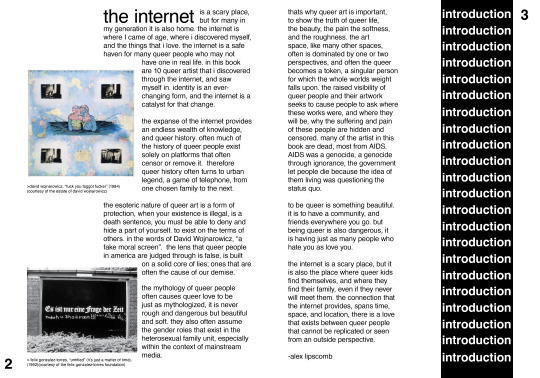

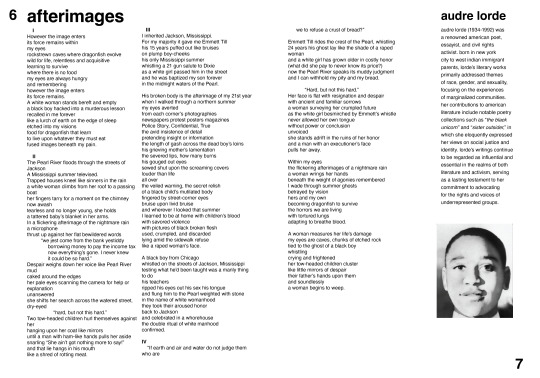
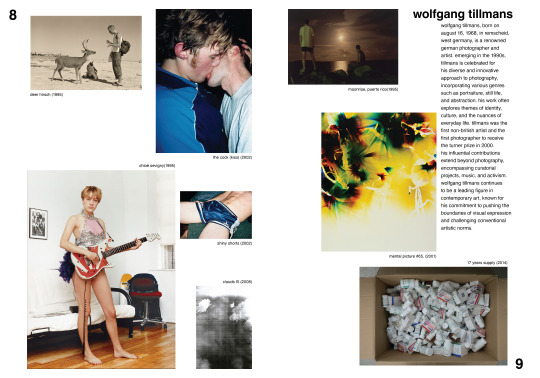

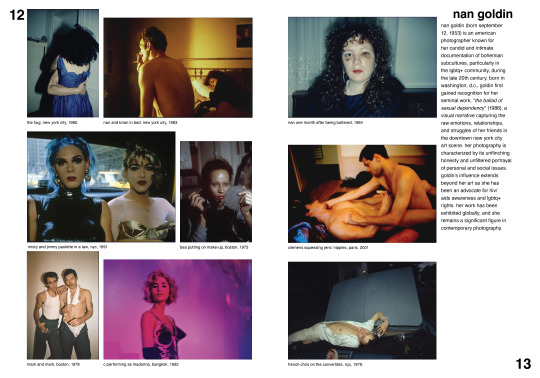

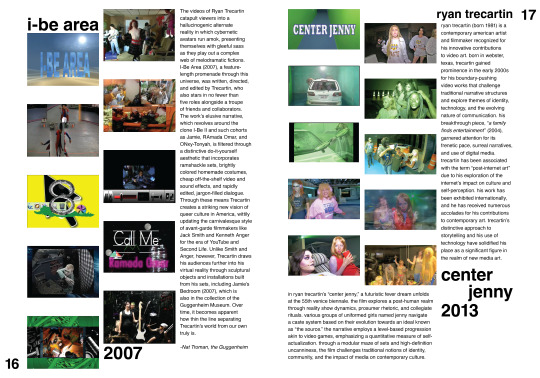
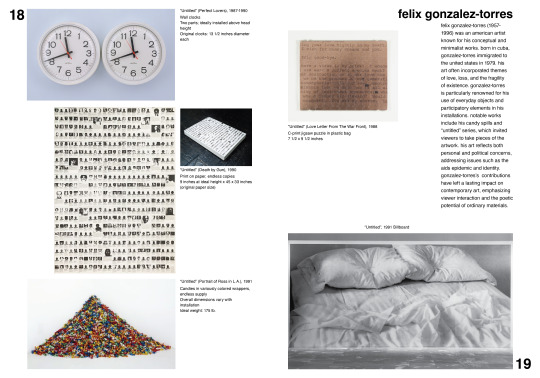
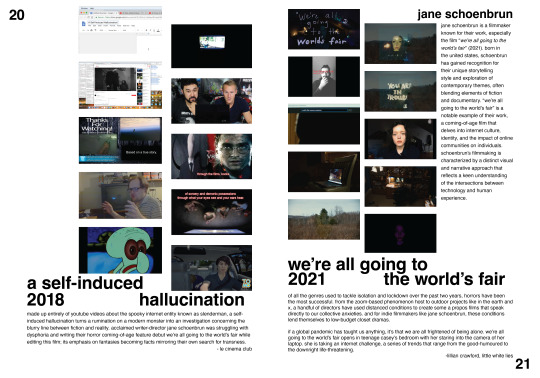


queer art book, 2023, digital
#communications design#fashion institute of technology#graphic design#graphic designer#book design#book#Gregg araki#Ryan trecartin#layout design#layout#indesign#queer art#nan goldin#david wojnarowicz#ocean voung#jane schoenbrun#richard silken#felix gonzalez torres#audre lorde#Wolfgang tillmans#queer artist
74 notes
·
View notes
Text
Terrence Malick, Ryan Gosling, Rooney Mara: 'Take your burden to the Lord and leave it there.'
"After saying to Faye (Rooney Mara) that he wanted “all that pain to be for something. Turn it into something,” he plays his song: “Take your burden to the Lord and leave it there.”"
Terrence Malick Beyond Nature and Grace: Song to Song and the Experience of Forgiveness, by Elisa Zocchi, University of Münster

Ethel Cain: "found this pic on my mom’s phone. this is the 100+ year old piano i learned how to play on and recorded all my old demos on. it sat at granny’s house for decades and then moved to my parents’ house and will go to me someday :)”

Ryan Gosling, SONG TO SONG, Terrence Malick


Ethel Cain / Rooney Mara as Christ figure
#ethel cain#terrence malick#mothercain#ryan gosling#music#rooney mara#art#hayden anhedönia#jesus#forgiveness#ethelcain#artist#musician#malick#song to song#piano#lord#god#jesus christ
12 notes
·
View notes
Text


*twirls my horse hair* hello sir... wats up...
#ryan's art tag#mlp fim#lord tirek#sorry but i am not sorry i am obsessed w/ him. sorry#i am rewatching the show and my brain is in horse autism heaven#edit: added anotha pic lol
24 notes
·
View notes
Text

#venom#venom 2018 3#marvel comics#comics#comics aesthetic#comic art#knull#god of symbiotes#hes so hot#donny cates#ryan stegman#one of the best designed characters#lord forgive me#i wanna fuck him so bad
11 notes
·
View notes
Photo

Urza, Lord Protector by Ryan Pancoast
#Magic the Gathering#MtG#Dominaria#The Brothers' War#Urza Lord Protector#Mightstone#Fantasy#Art#Ryan Pancoast
13 notes
·
View notes
Text
Sidney Crosby: Shrinking (Apple TV+), Prison Break (Hulu)
Alex Nedeljkovic: The Art of Clear Thinking by Hasard Lee; Same as Ever by Morgan Housel (he’s listening to it as an audiobook and reading a physical copy at the same time); Born a Crime by Trevor Noah; The Alchemist by Paulo Coehlo; American Sniper by Chris Kyle with Scott McEwen and Jim DeFelice; Red Notice by Bill Browder
Lars Eller: Factfulness by Hans Rosling, Billions (Amazon Prime Video, Paramount+)
Noel Acciari: Reacher (Amazon Prime Video), Mayor of Kingstown and Tulsa King (Paramount+), and “I’m watching Boardwalk Empire (HBO Max) with Steve Buscemi. That one, I’ve seen already twice through. I pick long series that I haven’t seen in a couple years, like last year I did a show called Power (Hulu). Then the year before, I rewatched Game of Thrones (HBO Max). All those long ones.”
Ryan Graves: American Kingpin by Nick Bilton - “it’s unbelievable”; Born to Run by Christopher McDougall; From the Ashes by Jesse Thistle; How I Built This podcast; and the Doctor’s Farmacy podcast.
Rickard Rakell: Mario Kart on Nintendo Switch - “I’m always Waluigi. Because it’s the best character… with the kart and the wheels, he’s the fastest one.”
Drew O’Connor: Entourage (HBO Max)
P.O Joseph: “Watch the Marvel movies, all of them. There’s like, 26. That’ll keep you busy during the week. You watch two a day, you’re not even going to get half of it done. I finished all of them. I did them in (chronological order versus order of release), so Captain Marvel is first, then Captain America.”
Marcus Pettersson: When We Were Kings podcast; and “I go through a lot of shows. I feel like there's a lot of different ones that catch my eye, but I like more sci-fi or fantasy. Like the new Lord of the Rings show, I watched… the new Game of Thrones, I've watched… and the old Game of Thrones, all of those. I watched a show early in the summer called Silo on Apple TV+. It's a really good one.”
pens recs for the bye week
#sidney crosby#alex nedeljkovic#lars eller#noel acciari#ryan graves#evgeni malkin#drew o connor#po joseph#rickard rakell#marcus petterson#pittsburgh penguins
174 notes
·
View notes
Text
Ahem ahem
After months of waiting!
I AM PRESENTING THE BRACKET FOR DUMBASS DUO SHOWDOWN!
CLICK FOR BETTER QUALITY!
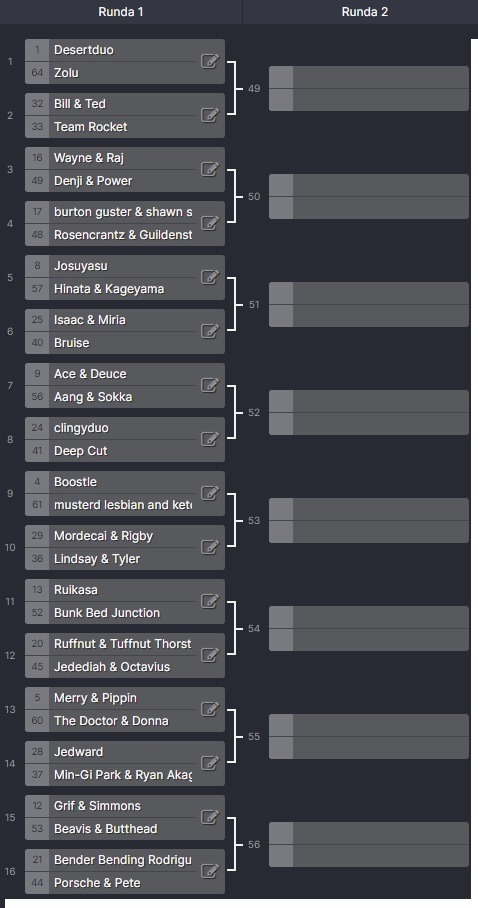
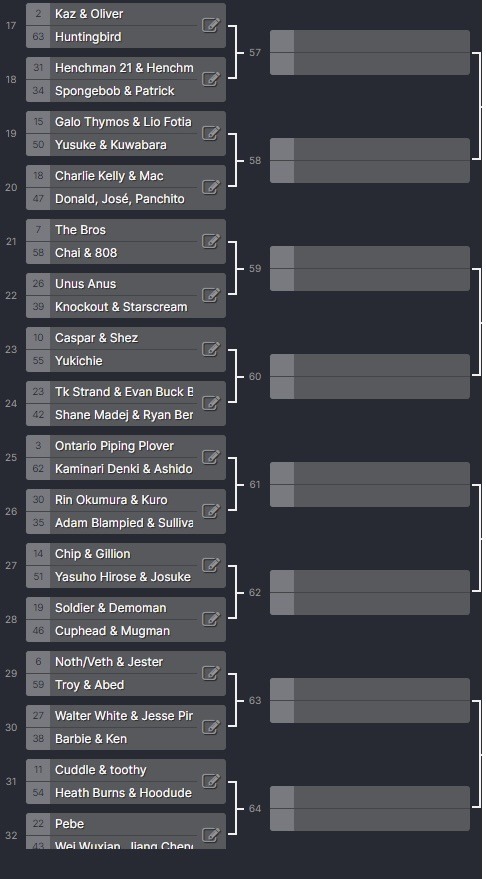
The first 16 battles will happen at 8pm CET (gmt+1)!
Group 1!
Uhh btw some of these were put on one day accidentally
Roronoa Zoro & Monkey D. Luffy aka Zolu (one piece) vs Good times with Scar & Grian aka desert duo (hermitcraft)
Bill Preston & Ted Logan (bill & Ted’s excellent adventure) vs Jessie & James from team rocket (Pokémon)
Wayne & Raj (total drama) vs Denji & Power (chainsaw man)
Burton & Shawn (psych) vs Rosencrantz & guildenstern (hamlet & rosencrantz and guildenstern are dead)
Josuke Higashikata & Okuyasu Nijimura aka Josuyasu (JoJo’s bizarre adventure) vs Shouyo Hinata & Tobio Kageyama (Haikyuu!)
Isaac & Miria (Baccano) vs Jay Walker & Cole Brookstone/bucket aka Bruise (lego ninjago)
Ace & Deuce (twisted wonderland) vs Aang & Sokka (avatar: the last airbender)
Tommyinnit & Tubbo aka Clingyduo (dsmp) vs Shiver, Frye, & Bigman aka Deep Cut (splatoon)
Blue Beetle (Ted Kord) & Booster Gold (Michael Carter) aka boostle VS Mustard Lesbian and Ketchup Gay from this post
Mordecai & Rigby (regular show) vs Lindsay & Tyler (total drama)
Rui Kamishiro & Tsukasa Tenma aka Ruikasa (project sekai) vs Zuke & Mayday aka Bunk Bed Junction (no straight roads)
Ruffnut & Tuffnut Thorston (how to train your dragon) vs Jedediah & Octavius (night at the museum)
Merry & Pippin (lord of the rings) vs The Doctor & Donna (dr who)
Jedward (irish music history) vs Min-Gi Park & Ryan Akagi (infinity train)
Grif & Simmons (red vs blue) vs Beavis & Butthead (Beavis & butthead)
Bender & Fry (futurama) vs Porsche & Pete (kinnporsche)
GROUP 2
1/8-18:30 & 2/8 18:30
Kaz & Oliver (mighty med) vs Bobbi Morse & Lance Hunter aka Huntingbird (agents of S.H.I.E.L.D)
Henchman 21 & Henchman 24 (venture bros) vs Spongebob & Patrick (Spongebob Squarepants)
Galo Thymos & Lio Fotia (promare) vs Yusuke & Kuwabara (Yu Yu Hakusho)
Charlie Kelly & Mac (it is always sunny in Philadelphia) vs Donald, José & Panchito (the three Caballeros)
The Bros (the bro duet) vs Chai & 808 (hi-fi rush)
Markiplier & CrankGameplays aka Unus Annus vs Knockout & Starscream (transformers)
Caspar & Shez (fire emblem warriors: three hopes) vs Yukiko Amagi & Chie Satonaka aka Yukichie (persona 4)
Tk Strand & Evan Buck Buckley (911 on fox lonestar) vs Shane & Ryan (buzzfeed unsolved)
Ontario Pipping Plovers (birbs from canada) vs Kaminari Denki & Ashido Mina (My hero academia)
Rin Okumura & Kuro (blue exorcist) vs Adam Blampied & Sullivan Beau Brown (No barrels rolled)
Chip & Gillion aka Fish and Chips (just roll with it) vs Josuke Higashikata & Yasuho Hirose aka Yasugap (jojo's bizarre adventure)
Soldier & Demoman (team fortress 2) vs Cuphead & Mugman (the cuphead show)
Nott/Veth & Jester (critical role the mighty nein) vs Troy & Abed (community)
Walter White & Jessie Pinkman (breaking bad) vs Barbie & Ken (barbie life in a dreamhouse)
Cuddles & Toothy (happy tree friends) vs Heath Burns & Hoodude Voodoo (monster high)
Pete Wentz and Gabe Saporta (bandom) vs Wei Wuxian, Jiang Cheng & Nie Huaisang (MDZS/the untamed)
TAGS TO CHECK OUT!
#propaganda
#dumbass duo showdown announcements
#dumbass duo showdown update
#round 1
#art gallery
#polls
#tumblr tournament#tumblr bracket#tumblr poll#fandom bracket#tumblr tourney#round 1#fandom poll#poll tournament#tournament poll#tournament#poll bracket#poll#one piece#hermitcraft#bill and teds excellent adventure#team rocket#total drama#chainsaw man#jjba#splatoon#psych#rosencrantz and guildenstern are dead#haikyuu#splatoon 3
170 notes
·
View notes
Text
A Huguenot, on St. Bartholomew's Day, Refusing to Shield Himself from Danger by Wearing the Roman Catholic Badge (1851–52) is the full, exhibited title of a painting by John Everett Millais, and was produced at the height of his Pre-Raphaelite period. It was accompanied, at the Royal Academy of Arts in London in 1852, with a long quote reading: "When the clock of the Palais de Justice shall sound upon the great bell, at daybreak, then each good Catholic must bind a strip of white linen round his arm, and place a fair white cross in his cap. —The order of the Duke of Guise."
It depicts a pair of young lovers and is given a dramatic twist because the woman, who is Catholic, is attempting to get her beloved, who is Protestant, to wear the white armband declaring allegiance to Catholicism. The young man firmly pulls off the armband at the same time that he gently embraces his lover, and stares into her pleading eyes. The incident refers to the St. Bartholomew's Day massacre on August 24, 1572, when around 3,000 French Protestants (Huguenots) were murdered in Paris, with around 20,000 massacred across the rest of France. A small number of Protestants escaped from the city through subterfuge by wearing white armbands.
Millais had initially planned simply to depict lovers in a less dire predicament, but supposedly had been persuaded by his Pre-Raphaelite colleague William Holman Hunt that the subject was too trite. After seeing Giacomo Meyerbeer's opera Les Huguenots of 1836 at Covent Garden, which tells the story of the massacre, Millais adapted the painting to refer to the event. In the opera, Valentine attempts unsuccessfully to get her lover Raoul to wear the armband. The choice of a pro-Protestant subject was also significant because the Pre-Raphaelites had previously been attacked for their alleged sympathies to the Oxford Movement and to Catholicism.
Millais painted the majority of the background near Ewell in Surrey in the late summer and autumn of 1851, while he and Hunt were living at Worcester Park Farm. It was from a brick wall adjoining an orchard. Some of the flowers depicted in the scene may have been chosen because of the contemporary interest in the so-called language of flowers. The blue Canterbury Bells at the left, for example, can stand for faith and constancy. Returning to London after the weather turned too cold to work out-of-doors in November, he painted in the figures: the face of the man was from that of Millais's family friend Arthur Lemprière, and the woman was posed for by Anne Ryan.
The painting was exhibited with Ophelia and his portrait of Mrs. Coventry Patmore (Fitzwilliam Museum, Cambridge) at the Royal Academy of Arts in 1852, and helped to change attitudes towards the Pre-Raphaelites. Tom Taylor wrote an extremely positive review in Punch. It was produced as a reproductive print by the dealer D. White and engraved in mezzotint by Thomas Oldham Barlow in 1856. This became Millais's first major popular success in this medium, and the artist went on to produce a number of other paintings on similar subjects to serve a growing middle class market for engravings. These include The Order of Release, 1746 (Tate, London), The Proscribed Royalist, 1651 (Lord Lloyd-Webber Collection), and The Black Brunswicker (Lady Lever Art Gallery, Port Sunlight). All were successfully engraved.
There are smaller watercolor versions of the picture in The Higgins Art Gallery, Bedford, the Fogg Art Museum, Harvard University, and a reduced oil replica in the Lord Lloyd-Webber Collection, all by Millais.
67 notes
·
View notes
Text
Player recommendations for the bye week
Courtesy of Michelle Crechiolo
January 29, 2024
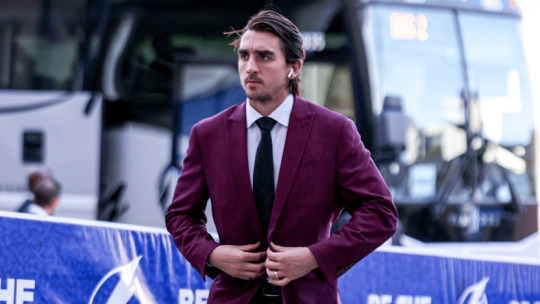
The Penguins began their annual bye week on Sunday, Jan. 28, which leads into the All-Star break. That means Pittsburgh won’t return to game action until Tuesday, Feb. 6, when they host the Winnipeg Jets at PPG Paints Arena.
A number of the players shared their recommendations for books, shows, and podcasts to help pass the time over the next week-plus until hockey is back, with some adding commentary to their picks. I tried including where you can stream the shows, but if you aren’t subscribed to the service I listed, I would do some research to see if it’s accessible elsewhere. Enjoy!
Sidney Crosby: Shrinking (Apple TV+), Prison Break (Hulu)
Alex Nedeljkovic: The Art of Clear Thinking by Hasard Lee; Same as Ever by Morgan Housel (he’s listening to it as an audiobook and reading a physical copy at the same time); Born a Crime by Trevor Noah; The Alchemist by Paulo Coehlo; American Sniper by Chris Kyle with Scott McEwen and Jim DeFelice; Red Notice by Bill Browder
Lars Eller: Factfulness by Hans Rosling, Billions (Amazon Prime Video, Paramount+)
Noel Acciari: Reacher (Amazon Prime Video), Mayor of Kingstown and Tulsa King (Paramount+), and “I’m watching Boardwalk Empire (HBO Max) with Steve Buscemi. That one, I’ve seen already twice through. I pick long series that I haven’t seen in a couple years, like last year I did a show called Power (Hulu). Then the year before, I rewatched Game of Thrones (HBO Max). All those long ones.”
Ryan Graves: American Kingpin by Nick Bilton - “it’s unbelievable”; Born to Run by Christopher McDougall; From the Ashes by Jesse Thistle; How I Built This podcast; and the Doctor’s Farmacy podcast.
Rickard Rakell: Mario Kart on Nintendo Switch - “I’m always Waluigi. Because it’s the best character… with the kart and the wheels, he’s the fastest one.”
Drew O’Connor: Entourage (HBO Max)
P.O Joseph: “Watch the Marvel movies, all of them. There’s like, 26. That’ll keep you busy during the week. You watch two a day, you’re not even going to get half of it done. I finished all of them. I did them in (chronological order versus order of release), so Captain Marvel is first, then Captain America.”
Marcus Pettersson: When We Were Kings podcast; and “I go through a lot of shows. I feel like there's a lot of different ones that catch my eye, but I like more sci-fi or fantasy. Like the new Lord of the Rings show, I watched… the new Game of Thrones, I've watched… and the old Game of Thrones, all of those. I watched a show early in the summer called Silo on Apple TV+. It's a really good one.”
#Pittsburgh Penguins#bye week#entertainment#January 29 - 2024#this is the article#for those who might not have access#or don't want to lose the list the next time the NHL updates its website(s)#but please follow the link and visit the story on the website#let MC get credit for generating traffic to the site#the more traffic such stories get#the more such stories she'll be allowed to write
16 notes
·
View notes
Text

Concept Art by Ryan Church depicting Moff Gideon standing on top of his crashed Tie Fighter, while holding the Darksaber on Nevarro. Image from The Mandalorian, Season 1, Episode 8, Redemption. Calendar by DateWorks.
Grogu hadn’t even met Moff Gideon and he was already tired of him. Tired of his attitude. Tired of his cruelty. Tired of his thoughtlessness. Tired of his very existence. Grogu couldn’t think of a more selfish, mean-spirited, abusive, liar. Which was saying a lot because Grogu had met Chancellor Palpatine when he visited the Jedi Temple on Coruscant and the tour took him through one of the classrooms where the younglings were getting ready for a lesson on galactic history.
Grogu remembered seeing his eyes glitter and flash red for just an instant. He told Master Unduli, but since he had no proof other than what his eyes had seen, the Master simply told him that she would keep an eye on the Chancellor during his visit. Sadly, nothing had come of that. He used to think that if he had done something more, perhaps he could have prevented the calamity of Palpatine’s reign.
Master Beq had assured him, when they discussed the matter during their escape from Coruscant, that many among the Jedi, knights and masters alike, who had spent far more time with the disguised Sith Lord, had failed to even notice as much as Grogu had in a split second and those who had, still did nothing meaningful. That was the insidious power of the dark side.
Grogu was not about to make that mistake a second time. Moff Gideon was just as clearly of a Sith heritage as Palpatine had been. Okay, he couldn’t use the Force. Yet. That’s right. Yet. The Force connected every living thing. For the time being, Moff Gideon was a living being. That meant that the Force connected to him and he might eventually understand it well enough to put it use. Based on what had happened to the Client and all those stormtroopers, it was pretty clear, the use he put it to was not going to be a good one.
That was the problem though. How do you defeat an enemy that you know will go to any lengths to get what they want? That have no moral or ethical limitations at all? It had taken a whole rebellion to be rid of Chancellor Palpatine and that had only been accomplished when there were still a few Jedi on hand to help. Even with that, people like Moff Gideon had managed to escape punishment. Who knew how many others like him still terrorized planets that thought the Empire had fallen?
Grogu suspected it was more than a few. Just like the Sith, these people were adept at blending into their surroundings until they were safe; their networks of spies and informants keeping them up to date on everything that was happening around the galaxy, or at least the section they had cared about. Making deals with cut throats and not caring about double crossing them whenever necessary. If he thought about them for too long it just made him sad and tired and frustrated.
It was at those moments he would remember something Master Yoda used to tell the younglings. ‘Sorrow, the opposite of joy, is not. Two may be true at once.’ Grogu knew that was important to remember. Many things could be true at the same time. Grogu could be frustrated and tired, but he was also motivated to prevent harm to his friends and he had a lot of friends. He could focus on more than one thing and accomplish his goals without losing balance. He just had to trust himself. And his friends.
Yes, Moff Gideon may be trying very hard to kidnap Grogu, but just because he wanted that didn't mean he would succeed. Greedy people wanted everything, but they never achieved that. It may motivate them, but it didn’t satisfy them. Nothing did. They weren’t whole and they never would be. They didn’t have friends to help them. They had accomplices and that just wasn’t the same.
In the meantime, Grogu needed to have a long discussion with his protector, the Mandalorian, about the provisions on board the Razor Crest. It seemed like the bounty hunter enjoyed ration packs and broth. Grogu enjoyed the broth, but really found ration packs to be akin to eating modeling materials. Yes, they were technically nutritious, and they smelled okay, more or less, but they were the wrong shape, the wrong color, and the wrong texture. They had no crunchy bones and an utter lack of unexpected sweetness. They were boring and predictable. In many ways they were the Sith of food. He got sick just thinking about them.
Then he started to laugh. He suddenly had the image of Moff Gideon being handed a ration pack. Looking at it. Studying it like a scientific specimen and then calling a stormtrooper over with just a crook of his finger.
“What, pray tell, is this? As it certainly isn’t food. Food has shape. It has substance. It has palatability. It entices. It refreshes. It fulfills basic needs. What else do you have that isn’t this?”
That stormtrooper looks over to his comrades and discovers that they have all abandoned their posts. It’s up to him. The stormtrooper is practically fainting he’s so worried about being the only target for the Moff’s wrath.
“Liquid rations, sir?”
“Liquid rations?! Liquid rations!”
Moff Gideon is incensed by the mere thought of the suggestion. Then he picks up a piece of something from the ration pack and takes a bite.
“It needs salt.”
“Of course, sir!,” and the stormtrooper runs away.
Grogu giggled again. Things could be worse depending on your expectations and even the greedy have to make do. That, at least, was satisfying. For now.
4 notes
·
View notes
Text
Film #608: 'Barry Lyndon', dir. Stanley Kubrick, 1975.
I suspect that Stanley Kubrick, like Alfred Hitchcock and Orson Welles before him, has become one of those directors that it is difficult to enjoy. What I mean by this is not that they make films that are hard to like, but that they have become so lionised by the history of cinema that watching anything they've made starts to feel a bit like homework. With Kubrick in particular it feels like there is a 'right way' to enjoy his films, which is to say, to study them intently and thus not enjoy them at all. Even his broadest comedy, Dr. Strangelove (1964), has had most of its pleasure leached out of it by successive generations of film scholars avidly discussing it as high art, repeating the same stories about Kubrick's perfectionism over and over until the film basically ceases to matter - it becomes, in this form, just an object one can point to and declare genius. So, you can imagine that I went back to Barry Lyndon with a bit of nervousness. After all, this is a three-hour period drama, and the first film Kubrick had released after 2001: A Space Odyssey (1968) and A Clockwork Orange (1971). Was this going to be enjoyable at all? Or was it going to be a final exam?
This isn't the first time I've seen Barry Lyndon, according to my notebooks. That said, I think that my first viewing must have been a hazy post-midnight watch a decade ago, because I have barely any recollection of it. This is true of many of the films early on in the list, which is partly the reason why I'm writing these summaries/essays - so that I don't have to rewatch a film in order to reflect on it years from now. What I certainly didn't remember from that first viewing was the scope of Kubrick's vision here - how lush the sets and locations and costumes are - or just how much story and how many events Kubrick has crammed into the three-hour runtime. Nor did I remember how witty and engaging the film actually is.

In the 1750s, young Irish rake Redmond Barry (Ryan O'Neal) is incensed when his cousin, Nora, falls in love with the advantageous Captain Quin, and challenges Quin to a duel. After his victory, Barry is quickly persuaded to leave town to avoid the repercussions, leaving his mother Belle (Marie Kean) and taking refuge in the British Army. Here, life for Barry is difficult but respectable - after the death of a family friend, however, Barry deserts his regiment and tries to escape to a peaceful country. He poses as a British lieutenant, but this disguise is seen through by a Prussian captain, who forces him to join the Prussian army instead. When Barry saves this captain's life, he is honoured and, following the Seven Years' War, given a job as a spy in the Prussian Ministry of Police. This continues one of the dominant threads in Barry's life: that of playing both sides until he determines where the advantage lies. Unbeknownst to Captain Potzdorf, he schemes with the professional gambler he has been asked to spy on, and the two escape the country before the Prussian government can arrest them. The life of a gambler is Barry's introduction to noble society, although initially an undignified one, as Barry is often called upon to fight duels in order to collect outstanding debts. However, when he lays eyes on Lady Lyndon (Marisa Berenson), he sees an opportunity for legitimate wealth and privilege. Lord Lyndon's abrupt death means that before long, Barry takes the title of Barry Lyndon, much to the disapproval of Lady Lyndon's son, Lord Bullingdon (played for most of the film by Leon Vitali).
Lord Bullingdon is right to disapprove - despite the birth of a second son, on whom Barry dotes, the marriage is toxic, with Barry wasting his wife's fortune and restricting her to the house. Most of Barry's financial ineptitude is devoted to the attempts to gain a permanent title as part of the landed gentry. Barry's mother, reunited with her son, also pushes him to attain a title, although it seems that Barry doesn't really need any more encouragement. Barry's relationship with his stepson grows more antagonistic, culminating in an outright brawl during a concert. After this, Lord Bullingdon abandons his family's estate, seeking to make his own way in the world. Tragedy strikes when the younger son is thrown from a horse which is to be his birthday present, despite the boy's promise that he will not ride the horse unsupervised. Barry is inconsolable, and Lady Lyndon's condition worsens. For a time, the estate is left in the care of Barry's mother, who makes several calculated staff cuts under the guise of attaining financial stability. Several of the estate's long-standing staff persuade Lord Bullingdon to return and challenge Barry to a duel. Despite the opportunity to easily win the duel against the petrified Lord Bullingdon, Barry refuses, believing that Lord Bullingdon will have received his satisfaction. He is wrong about this, though, and gets shot in the leg, requiring amputation. Barry is offered one final lifeline: an annual stipend from his wife's estate, as long as he never returns to Britain. He accepts, and the final scene of the film shows a recovering Lady Lyndon, pausing thoughtfully as she signs Barry's annuity check.
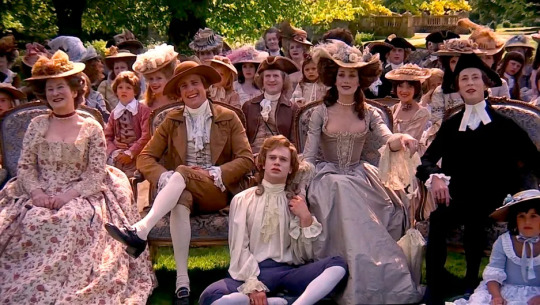
That description should give a sense of just how eventful Barry Lyndon is as a film. I haven't even mentioned the minor events - Barry's brief relationship while posing as a lieutenant; the scene with the highwaymen; the fact that Captain Quin survives the duel after all - because they're of limited importance to the main plot. What Kubrick has succeeded in is bringing the fullness of a picaresque novel to the screen and giving it the true ambience of a serial novel. One element that really adds to this is the perfect casting of even the smallest roles. All the minor characters who appear, from the highwayman's teenaged son to the soldier that Barry bests in a boxing match to Captain Potzdorf's governmental uncle, are all given performances of such precision and vividness that they feel like entire chapters of Barry's life, even though they spend mere seconds on screen. Kubrick also makes Barry Lyndon's literary sources explicit by dividing the film into halves, each with its own wordy subtitle that tells us what we're about to see. There's also a significant shift from William Makepeace Thackeray's original novel which is largely unavoidable: the novel is told in the first person while the film, out of necessity, takes a more objective third-person approach. Kubrick has kept an omniscient narrator at times, to clarify events that Barry is not present for or which lack an impartial observer to explain. However, the majority of the film comes to us seemingly unmediated, which I think might be partly responsible for the reputation that has become attached to the film: that it's cynical and cold.
On the charge of cynicism, it's hard to disagree. Redmond Barry undergoes a slightly odd shift of personality when he meets Lady Lyndon, suddenly becoming cruel and callous in a way that seems too quick, even for a film that compresses time in this way. He's started as a deeply romantic figure, but one of the first times we see him after his marriage, he's blowing pipe smoke into Lady Lyndon's face despite her protests. His drive has become naked greed, which seems a little out of proportion with his behaviour immediately prior to the wedding. When this change has been commented on, it's usually suggested that Barry's romanticism has been dashed by his wartime experiences. I think this is a perfectly fine explanation, but I just don't see it on the screen to quite the degree I would anticipate. The events following the death of Barry's son are also deeply cynical - Lady Lyndon's depression and Barry's turn to alcoholism are indicative of Barry's failures as a husband and of the futility of his aspirations for wealth. Lord Bullingdon fights for his family's honour, but is terrified as he does so, and death would in some ways be a kindness to Barry, who faces mounting debts. Even his exile does not rid the Lyndon estate of him, as they are perpetually bound to pay his annuity. All ends as well as it could be expected to, but that does not mean unencumbered happiness for any of the characters.
But does this mean that the film is 'cold'? I don't think so at all. Kubrick paints the first two thirds of the film with streaks of broad comedy, the effects of which linger long afterwards. Barry's awkward courtship with his cousin, the ruse by which he and the Chevalier de Balibari (Patrick Magee) escape Prussia, and even the duels Barry fights on the Chevalier's behalf, were all met with loud laughter from the packed Embassy Theatre screening. Even in the duel against Lord Bullingdon, there are beats of humour to leaven the gloom that hangs over everything. The film may be judgmental of its protagonist, but it does so while looking at a world full of witty and absurd characters.

Another element that has contributed to the film's chilly reputation is its visual style. Kubrick was partly inspired by the paintings of William Hogarth, and in one of the film's most famous images, Barry is shown in an almost identical pose to Hogarth's Marriage A-la-mode 2 (a painting which could basically sum up the entire second half of the film). What this means, on a practical level, is a large number of carefully-constructed tableaux, expressive lighting techniques, and landscapes in which the power of the elements overwhelms the human figures. The cinematography was the work of the Academy Award-winning John Alcott, who also worked with Kubrick on 2001 and A Clockwork Orange, and it is in every respect remarkable: stately and dramatic when it needs to be, caring and intimate at other times, but never obtrusive when the performances need to carry all the weight of a scene. I'm not completely sure where this style's association with 'coldness' comes from, but I imagine it's probably been reinforced by Kubrick's reputation as a perfectionist, which I think usually robs a director's films of warmth, too, which is what I was thinking of way back in my opening paragraphs. A reputation like this is almost never factually accurate, and stories tend to get blown out of proportion. Kubrick and Alcott shot many of these scenes without electric lighting, and famously borrowed three large and expensive lenses left over from the Apollo missions which enabled them to shoot some indoor scenes by candlelight. However, this fact has been blown out of proportion, and it's now commonly said that the production used no electric lighting at all - a story that's completely implausible if you look at any of the exterior nighttime scenes. Even the artificial lighting, however, successfully mimics the natural lighting to such a degree that it feels like it was filmed on location in time as well as place.
Because Kubrick's previous films were heavily based in more popular genres, and because they all shared a more acidic and satirical edge, many audiences were unsure what to make of Barry Lyndon, and the film was a disappointment at the box office. Critics were equally dismissive - multiple critics, including Charles Champlin and Pauline Kael, referred to it being less of a film and more of a coffee-table book, with Kael adding that Kubrick had "drained the blood" out of the source material. Even Vincent Canby, in an otherwise positive review, described the film as "another fascinating challenge". I find these statements a little odd, given that Kubrick's other films were no less weighty or accessible than Barry Lyndon was, but I think this is always one of the problems of trying to anticipate what a director renowned for being surprising will do. Although making a slow and stately film is entirely appropriate to what Kubrick clearly wanted to say about Thackeray's novel, it seems like this was the wrong type of surprise to viewers who wanted another breaking of their expected boundaries. In any event, this critical disappointment had an apparent impact on Kubrick. It definitely factored into his decision to make a slightly more traditional genre piece next... The Shining (1980).
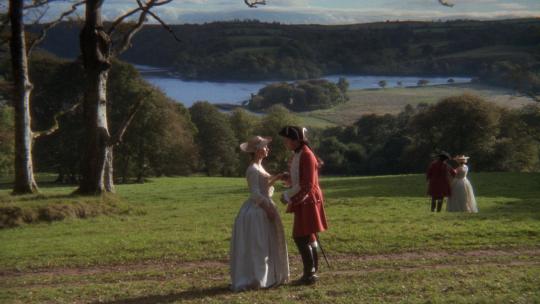
Despite this, Barry Lyndon underwent a reappraisal over time, and it is now recognised as one of the director's masterpieces. Although I'm usually loath to rank films, I think Barry Lyndon definitely falls in my top three for Kubrick's films, and it certainly seems like one of his most accessible films. It merges the farcical comedy and bleak satire that his films are known for, while also being endlessly appealing on a visual level. Far from being worried that it was going to be homework, I'm tempted to go and watch it again already - and that's not something I say about a lot of Kubrick's three-hour-long doorstops.
10 notes
·
View notes
Text
an ask from @spacecadette on this game has, i regret to say, made me go feral... the rest of the answers to your questions are coming in the queue but let's dive into the one i thought deserved its own post:
say something about your ships that you want to say!
so... a musing on the five couples i said i'd play this ask game with - and then, for additional fun, some i didn't - on a crucial question:
are they barbie people or oppenheimer people?
answers under the cut:
bellamort: lord voldemort was definitely not traumatised by the second world war and it's ridiculous to suggest otherwise. they're seeing oppenheimer, and bella only has to hold his hand for about half of it.
riddledore: barbie. absolutely no doubt about it.
snack: they were going to go and see oppenheimer but they had an argument which culminated in them fucking over the kitchen table and missed the showing.
snapemort: they do the double, because it's important to be thorough, and they only have three or four arguments on which film to see first.
tomarry: front of the line for barbie. each of them thinks the other is the ken in their relationship.
-
barty crouch jr/voldemort: oppenheimer.
deamus: dean was the art director for barbie. they're at the premiere. seamus reports back to anyone who'll listen that ryan gosling is an angel.
dramione: they do the double. draco thinks both films are about the dangers of mixing with muggles. they break up for the sixth time that month.
drarry: barbie. draco is assumed to be in costume by the staff at the cinema.
dron: they're both hooked on the fourth test and don't leave the house for four days.
fleurmione: omar el zohairy's feathers, followed by barbie.
flonks: barbie, but they spent the entire time making out.
grindeldore: oppenheimer, obviously.
harmony: are a terrible couple who loathe spending time with each other. oppenheimer.
hinny: barbie. james announces, furiously, that this means he can never go to see it now, because harry loved it so much.
jegulus: i don't know her, sorry.
jily: the vhs of when harry met sally they've had since 1991.
linny: indiana jones, which luna thinks is a documentary.
lucissa: 'we've never heard of a cinema and the implication that you saw us watching gentlemen prefer blondes at the curzon last friday is insulting.'
marge dursley/dolores umbridge: neither, they're at a dog show.
minerva mcgonagall/wilhelmina grubby-plank: they're still recovering at their house on mull from the reeling at filius' wedding.
pavender: do you even need to ask?
poppy pomfrey/pomona sprout: barbie.
prongsfoot: mission impossible.
remadora: they do the double, see barbie first, love it, get bored halfway through oppenheimer, get arrested for public indecency.
romione: initially attempting to be cerebral, they go to see asteroid city, despite the fact that ron truly does not fuck with wes anderson. they come back the next day, bicker over popcorn choices, see barbie, and have a wonderful time.
ronarry: barbie, in matching hot pink tracksuits.
scorbus: they were going to see barbie. they forgot.
snarry: severus mysteriously has potions which need finishing whenever there's a showing of either.
snily: after some spectacular arguing, they do the double, oppenheimer first. severus pretends he didn't like barbie more.
snucius: la traviata at the royal opera house, barbie - separately - the following day.
taco: barbie. in this case both draco and tom understand inherently that draco is the ken.
tombraxas: barbie. abraxas thinks the costuming is exquisite. tom just thinks it's nice the colour saturation means you can see the film.
wolfstar: they are on holiday over opening weekend. they see barbie in spanish. remus cries.
#barbenheimer#and all the harry potter ships i care to think of#unhinged and deranged ships#imagine how bad this would be if i didn't take elvanse
37 notes
·
View notes
Text
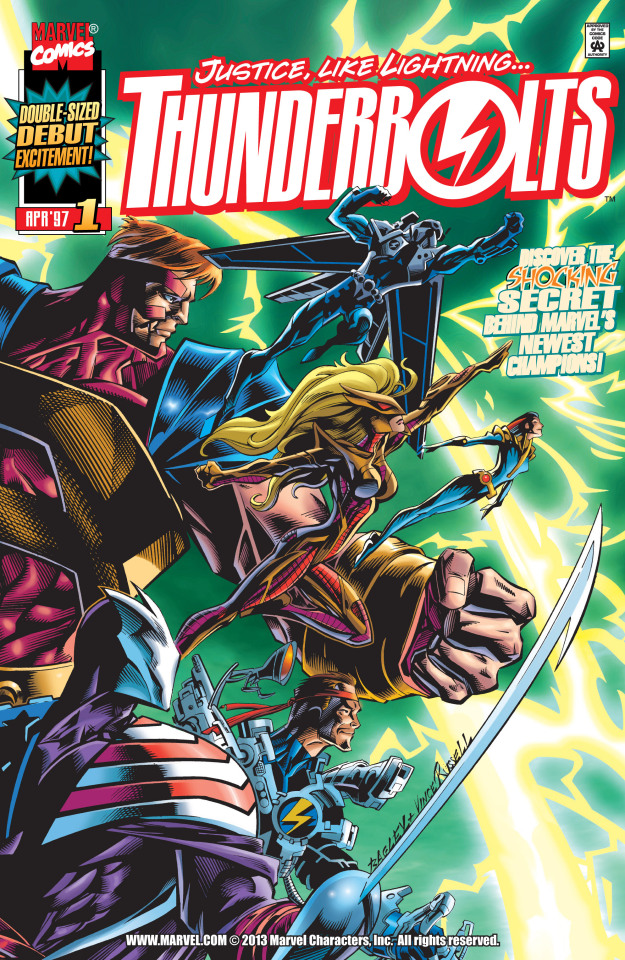
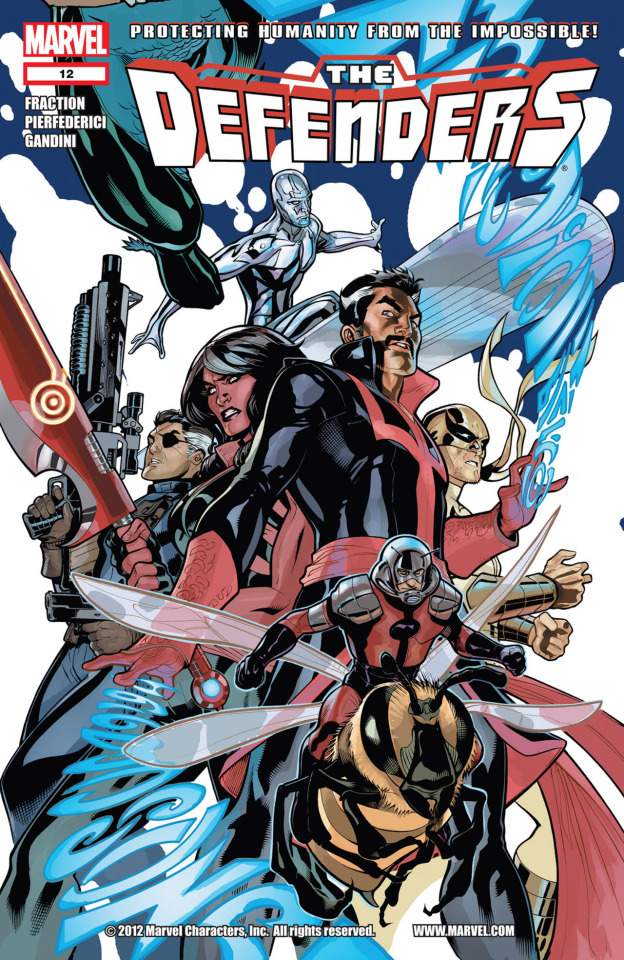
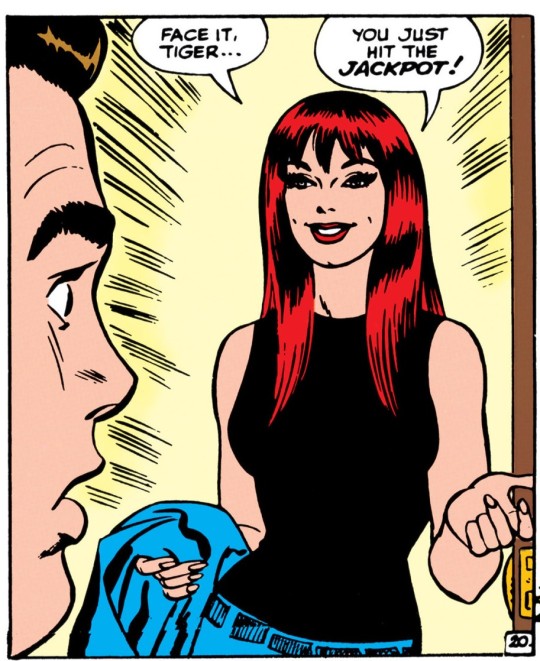
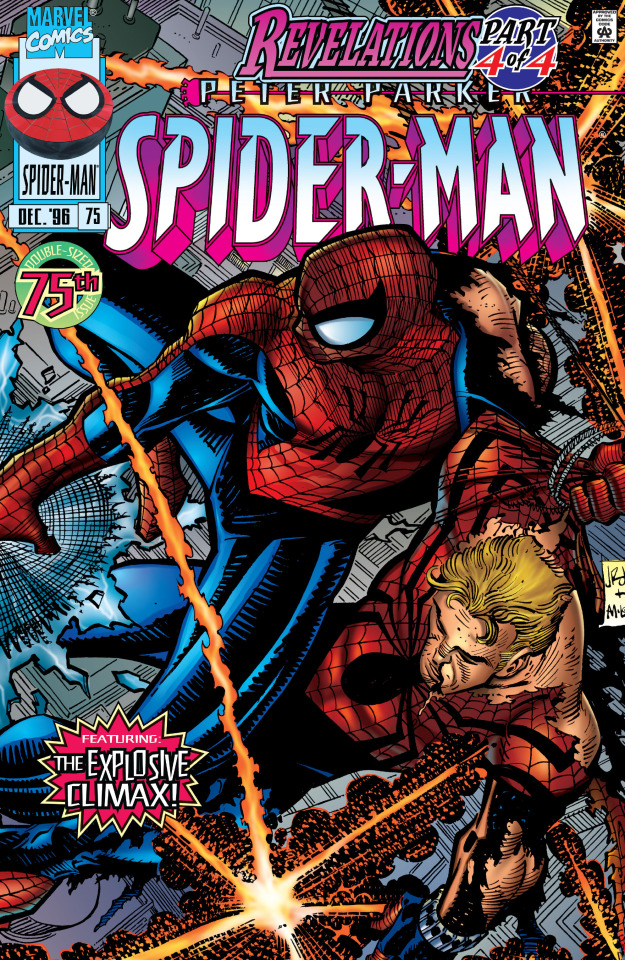
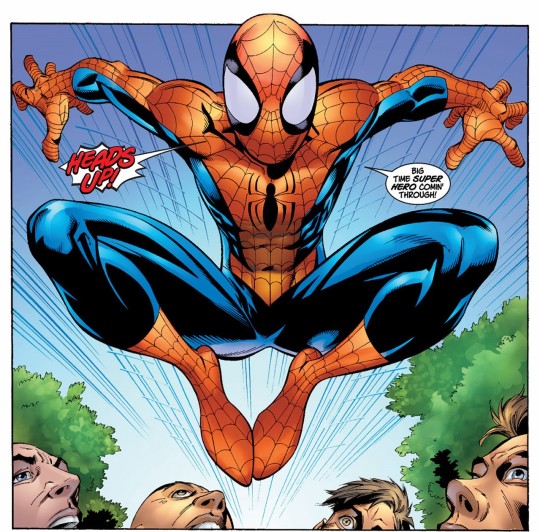
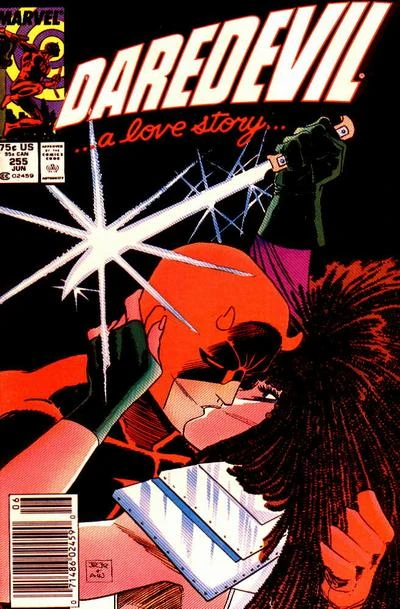
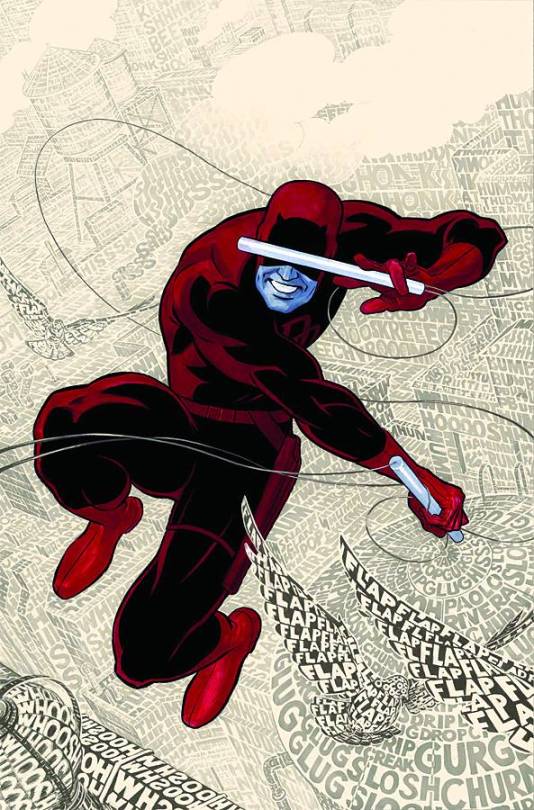
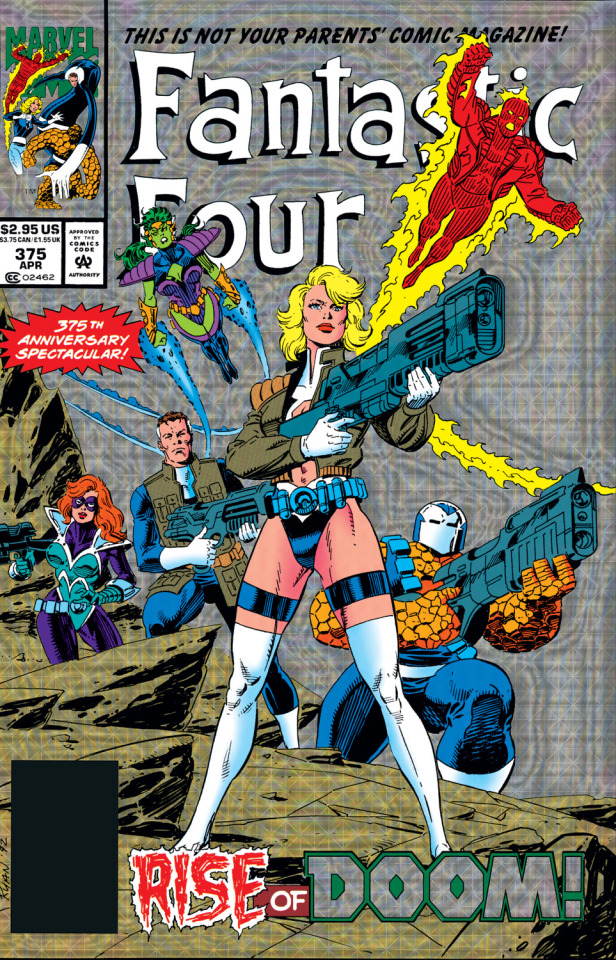
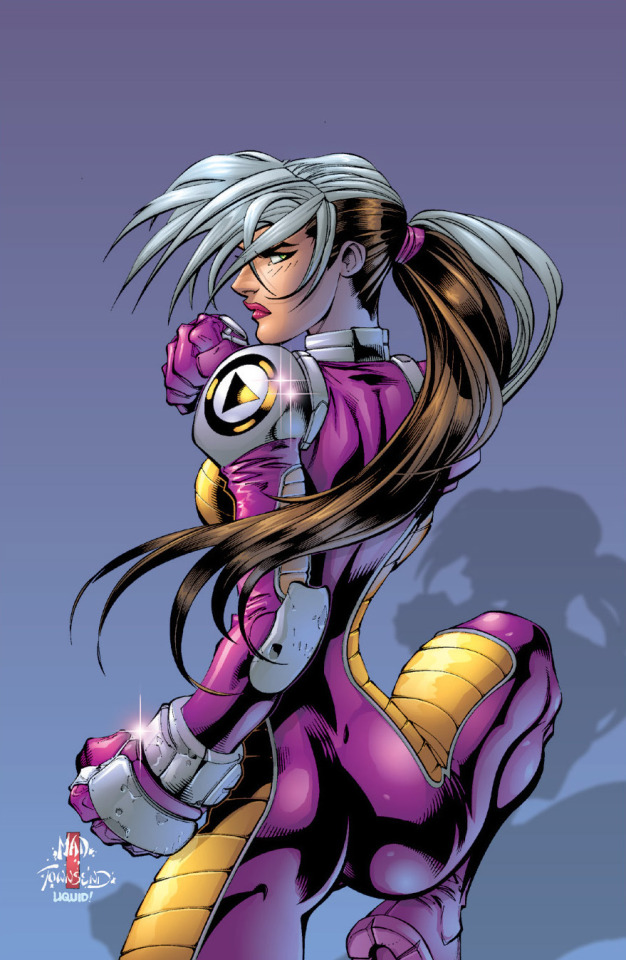
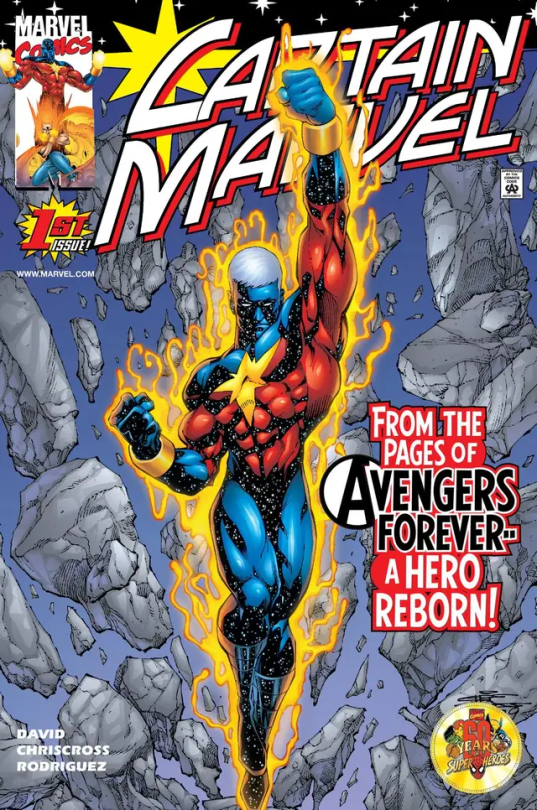
@comfortfoodcontent did it first, but here are my Top 10 Marvel Comics runs, in no particular order.
Thunderbolts 1-75 by Busiek, Bagley, Nicieza, et al. - indisputably the best, wouldn't still be reading comics without it.
Defenders vol 4 1-12 by Fraction, Dodson, McKelvie, etc. - the shortest run on this list but one of my all-time fave comics that I re-read more often than most.
Amazing Spider-Man by Lee, Romita, etc. (issues 39-122) - while the Lee/Ditko run is great and features the introductions of so many iconic villains and characters, the soap opera elements of this era, culminating in the Death of Gwen Stacy, with Romita drawing both MJ and Gwen, makes it the best to me.
Spider-Man comics from Revelations to The Final Chapter - possibly the most overlooked era, this stretch of 20+ issues each of 4 different ongoing Spidey series, from the end of the Clone Saga/Ben Reilly era to the Byrne relaunch, are the comics that were coming out when I started reading as a young lad, and will always be my favourites, especially with Wieringo and JR Jr. and Steve Skroce doing much of the art.
Ultimate Spider-Man 1-160 by Bendis, Bagley, Immonen, Lafuente, etc. - The best attempt to make Spider-Man relevant to teens again without just sticking Peter in a perpetual loser cycle.
Daredevil by Nocenti and Romita Jr. (250-282) - I don't think there's a bad DD comic between 168 and 300, but these ones are the best.
Daredevil by Waid, Rivera, Samnee, etc. (vol 3 1-36, vol 4 1-18) - After a period of time where I wasn't buying comics at all, this brought me back and got me collecting like never before.
Fantastic Four by Defalco, Ryan, etc. (356-416) - I know in my heart that there are better FF runs, but this one has Lyja Lazerfist and Psi-Lord Franklin Richards and Sue Storm's ridiculous swimsuit costume and it is my favourite.
Post-Onslaught X-Men (specifically Uncanny 341-350, X-Men 62-71) - Again, these issues are intrinsically linked to childhood memories but also the Joe Madureira and Carlos Pacheco art is amazing and the stories are fun.
Captain Marvel by Peter David, ChrisCross, etc. (volumes 4 and 5) - IDK I just love these comics. They're very fun.
29 notes
·
View notes